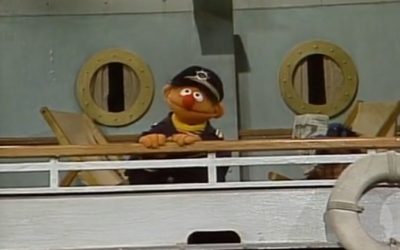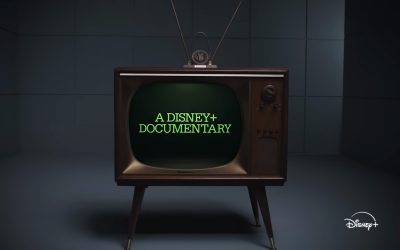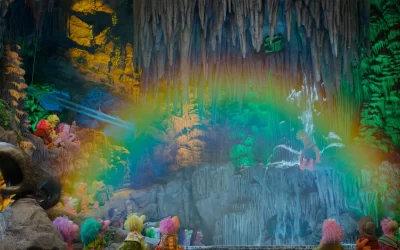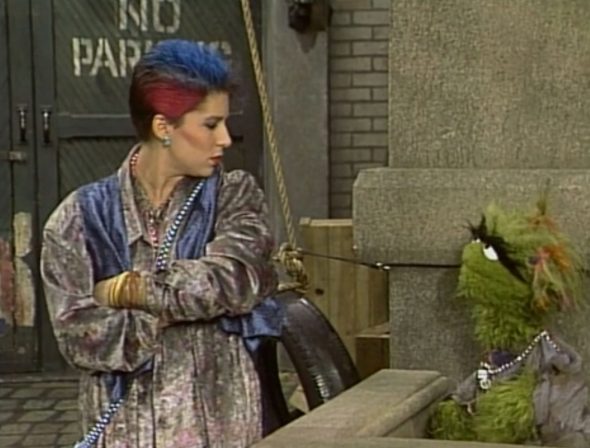
Not long ago on this very website, I published an article about a human character who was seen on Sesame Street exactly one time and never again. I had found a newspaper article from 1987 in which producers described the character as a “punk rock teen,” and revealed that they had decided the character was too edgy for Sesame Street. If you haven’t read the article I wrote on the subject, you can read it by clicking right here.
When I shared the link on the Tough Pigs Facebook page, a reader named Michael Engel suggested in the comments that we should follow up by speaking with the actor who played Tanya, the aforementioned punk rock teen. It was an interesting idea. So I did it!
That actor’s name is Danielle Striker, and she generously agreed to share her story with Tough Pigs. As you’ll see, the story features some unexpected twists and turns, and includes an impressive career as a poker expert and founder of the company Poker Samadhi. I talked to Striker and her Poker Samadhi colleague Susan Kennedy over Zoom.
And now, Danielle picks up her story from the beginning!
Danielle Striker: It’s so funny because you’re going back quite some time here. This is 1986! And I had a very interesting life after February 1986. June was very difficult… It was a cataclysmic event which I’ll tell you about.
I’ll give you as much as I remember. I want to say it was late 1985. I had been on Broadway with Anthony Quinn in Zorba in 1982 and 1983, and prior to that I was in a national tour of a show called They’re Playing Our Song. I was a Broadway performer, a triple threat: dancer, singer, actress. That was really my chosen profession.
My agent at the time, who was Barbara Andreadis – I can’t even believe I remember that – she said, “You’re not going to believe this, but we got a submission for a ‘punk rocker teen’ for Sesame Street.” And I said, “Sesame Street? Sesame Street, like Sesame Street the show?!”
I knew Madonna back in the day because Madonna and I had taken classes together.
Tough Pigs: Oh, wow!
DS: Yeah, we had taken dance classes together. It’s a very, very small world. I didn’t know her very well, but I did take dance classes with her. She was just getting really big – she’d done “Holiday” and released her first album, and I think “Like a Virgin” had just come out. So everyone was wearing short hair and black rubber bracelets – and really, she wasn’t a punk rocker, but she was stirring it up.
TP: Right, and maybe to the “normies” that would have appeared to be what they would consider punk rockers.
DS: Exactly! So someone writing at Sesame Street thought this would be a great character to have, and I was hell bent on getting this role. It was supposed to be, if it worked out, a recurring role. That’s what I remember.
TP: That’s something I was going to ask about. That’s interesting.
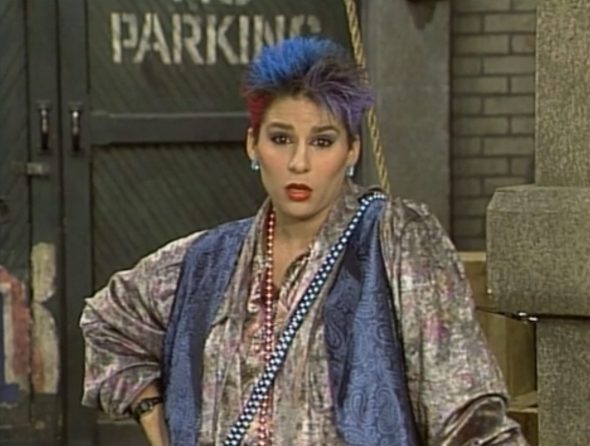
DS: Yeah! I was really excited, so I went to a costume store and I got this giant, black, spike-haired wig, and all these punked-out ripped t-shirts. The auditions were on Broadway at 67th or 68th where [Children’s Television Workshop corporate offices] was located. I had black boots, these big Doc Martens, they had just come out. I was over the top. And I literally drove my motorcycle to the audition! For some reason I thought they would see me, but of course they didn’t see my motorcycle. But I came in with my helmet, totally punked out, and I was over the top, and when I walked in, they just went, “Oh my God, you’re it.”
It was great. They gave me the script; I read it. They said, “Don’t change anything; we love it, we love you.” It was one of those kind of perfect auditions. Of course, being in show business you go, “Yeah yeah, I did my best.”
I left. I called my agent and said, “I don’t know how I did.” And she said, “I already got a call!” Before I even called her! Because back then we didn’t have cell phones, so I got on my motorcycle, drove to my apartment, took everything off, and then I called her and my agent said, “I already heard. They want you.”
TP: So you don’t even know how many other people they might have brought in, or if you were the only one.
DS: I think I was one of the last people, so I don’t know how many.
TP: So, you sold the punk look they were going for, obviously.
DS: It was just so my deal, so my jam. I just went in as this character, and they were like, “Oh my God, this is just too great.” They wound up calling my agent, and it’s funny because Susie [Kennedy, Danielle’s Poker Samadhi colleague] was asking me how much I was paid… I do not know, but I remember getting residuals. I think I got like a thousand dollars, or twelve hundred dollars? It was very minimal. But I would get these ten-dollar checks for like ten years afterwards.
TP: Right, that’s the time when Sesame Street would air these segments over and over again. Probably the “Grouch Girls” song was recycled over and over for years after that.
DS: Yeah! So, my agent calls, I get the contract, I sign it, and they say, “Okay, you’re gonna film!” I was so excited. “I’m gonna go to Jim Henson’s Muppet studio!”
TP: Had you grown up watching the show?
DS: No, I was 25 when I got that role, so…
TP: So, you were a little old for it when it was on.
DS: I was way past that, yeah. I remember The Electric Company, and (sings) “Zoom, Zoom, Zoom-a Zoom!” That was a little more my era.
So anyway, I take my motorcycle, and – that was the old Dick Cavett studio, I think.
TP: Yeah, from what I’ve read, they were taping at the former Dick Cavett Show studio.
DS: Yep. So, you park on 54th Street or something, I went in, it was early in the morning… and I walked in and it was like magic. You literally walk in from the street — and somebody escorted me down a few steps — and there you are! You’re in the land of Sesame Street! Have you been?
TP: Yeah! I’ve been to the current set, and it’s a pretty surreal experience to be walking down a hallway with fluorescent lighting and linoleum tiles, and then you open a door and there’s Hooper’s Store right in front of you.
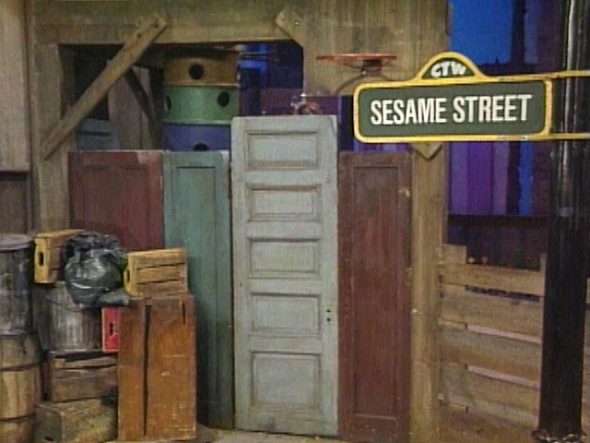
DS: And there it is! The funniest thing is, I remember walking in… and Big Bird walks right by me! It was freezing in there, and I’m like “Oh my god, there’s Big Bird!” The original guy! He takes off [the top half of the Big Bird puppet], and he’s like, “Hi, I’m [Caroll Spinney] and I play Big Bird!” Really nice guy. Super nice guy.
I said, “It’s nice to meet you,” and he said, “Well, what are you doing here today?” and I said, “I’m playing the punk rocker.” They said, “You need to get to makeup,” so they took me, and the gal who plays Micki came out and she’s like, “Hey, you want to run some lines?” I hadn’t even seen the script. You got it that same day, and it’s an all-day thing. You’re there from, like, seven in the morning to seven at night. They do the whole thing in one shot.
TP: Were they only shooting your episode that day?
DS: Yes.
TP: Okay, ‘cause I know they were doing something like 130 episodes per season in those days.
DS: It was nuts.
TP: But it was just your episode that day.
DS: I’m pretty sure it was only my episode. They might have done something behind me, but I’m not sure.
Anyway, you get there and everybody’s so nice, and “You want something to drink?” and they have all the food and the break room. You go to makeup, which is one room – they do makeup, they do the hair. They go, “What do you want to do costume-wise?” and I went and picked out all my costumes. They’re like, “You just pick out whatever you want, what you feel like is you.” They’re very creative and open. So, I pick what I want, and they sprayed my hair and did my makeup.
Then I’m walking out and they go, “Do you want to go to the Muppet room?” Oh my god, of course. Have you been to this room?
TP: You mean the room where the puppets are?
DS: Where the heads are! Where all the Muppets are! Oh my god, it’s so cool! You walk in and there they are – it’s Elmo, and Snuffleupagus – that thing’s huge. And all these little heads just sitting there on a piece of wood!
TP: Were they keeping Snuffleupagus hung up from the ceiling at that time?
DS: Yes. He was hung up from the ceiling. ‘Cause he’s so big! And Big Bird – that guy was already walking around, practicing his lines and doing Big Bird. I was just in awe of all these Muppets.
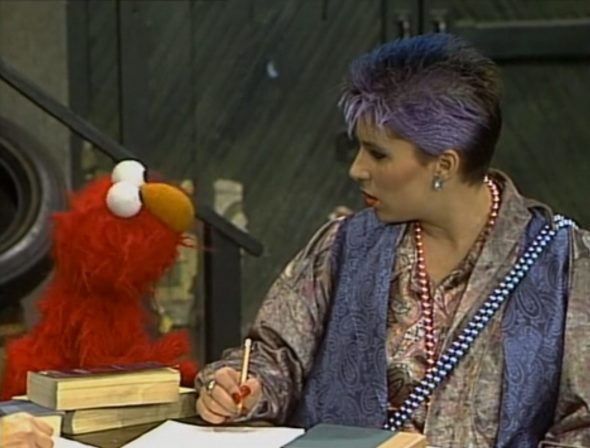
DS: Then I think we did the Elmo scene first. The guy who played Elmo was, if I remember, an African-American gentleman.
TP: Kevin Clash.
DS: That’s right. He was so nice, and it’s so great how they do this, because they sit on the floor – we were at a table. He was like, (deep voice) “Hi, I’m [Kevin] and I’m playing Elmo,” and then it’s (high, squeaky voice), “HI, I’M ELMO!” Like, wow! What a range!
We did all our lines, all our rehearsing, and then they were like, “You ready to shoot?” and I think we maybe did three or four takes, and it was such a cute script. I remember there was a word that repeated…
TP: Yeah, the episode guide on Muppet Wiki says Tanya and Micki teach Elmo the meaning of the word “original.”
DS: “Original! Original original original original!” Yes, that was it! He was like “What’s original?” and then I explain what it is. I don’t even remember my lines anymore, but Elmo goes “Original! Original! Original!” and Micki and I are like “Yeah, okay, Elmo…” We did that scene, and that was a really short scene, and that went well.
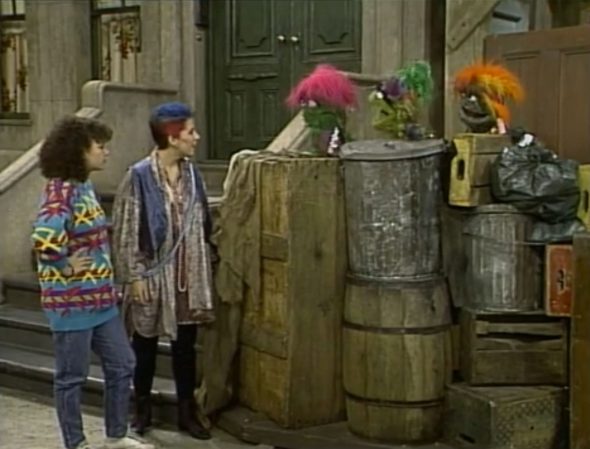
DS: Getting the Grouch Girls, that was a big deal, because they practiced and practiced on a loop, because that wasn’t done live, obviously.
TP: They were lip-synching.
DS: They were lip-synching, right. They have the recording and you hear it in the background like forty times before you ever get to film it. (singing) “Grouch Girls don’t wanna have fun!” And Cyndi Lauper was huge at this time. She was considered a punk rocker.
Then we practiced all our lines with the Grouch Girls, and I think there were two people behind the Grouch Girls. There’s three Grouch Girls, but I think there were only two Muppeteers.
TP: So there might have been one puppeteer doing two of them at the same time?
DS: Two of them on one. We’re doing our lines, and in the middle of this thing, I can’t remember Micki’s name. If you notice, when I’m talking to her I go, “Come on… (pause) … Micki!”
TP: I wasn’t going mention that, but it does look like there’s a little hesitation! But I actually love that stuff, watching old Sesame Street where they would just kind of let that stuff go. It feels very organic.
DS: (laughing) Oh, it was horrifying! When I saw it, I go, “No, you should have edited!” But again, we only did two or three takes. They’re great; they have multi-cameras and it’s just a great group of people. It was really fun. They just let you do whatever you want – “Just dance and have fun!” It was just (singing) “Grouch Girls don’t wanna have fun!”
We did that, and I had a nice conversation with the guy that plays Big Bird. He was great. Super-nice guy.
TP: Was there any learning curve of the whole “Look at the puppet, don’t look down at the puppeteer” thing with Elmo or the Grouch Girls?
DS: Yes, they tell you to look at the puppets. To look over the puppet, actually. You don’t want to upstage them either, and you don’t want to look backward. You’re on an angle and you’re not really looking at them but it looks like you are.
TP: The camera makes it look like you’re making eye contact.
DS: Right. They want you to look over them so you’re not really looking at them. It’s funny; you realize there’s somebody down there so you kind of want to go like this (glances down), but they teach you not to do that.
So, you’re there for the whole day and the day flies by, and before you know it, it’s 6:30 and they’re like, “Okay, that’s a wrap!” And they loved it. The shoot comes out, and the producers are great. They call my agent. They love me: “Oh, we think this is gonna be a recurring role. It’s so cute! Everybody laughed! Blah blah blah blah blah.”
Now the thing comes out in February. I did see it – I’ve seen this “original original original” thing once.
TP: The version that aired on TV, in the episode?
DS: The version that aired on TV, [episode] 2155. It goes off, and my agent’s so excited: “We’re gonna get you a recurring role! We’re gonna get you back!” Back then they were paying really good money to be a recurring role.
TP: Nice! Did you get to meet any of the other human cast members, or was it just Micki on the set that day? Or did you meet any of these actors who played Susan or Gordon or Maria or Bob…?
DS: I did… I believe I met Bob, and I think Maria was there but I didn’t actually meet her that day.
Anyway, the thing airs, and everyone’s ecstatic. Then we hear “some woman,” who I didn’t know at the time, called up and was just… beyond… that this “punk rock” character was going to influence the children, and be such a bad influence. I was mortified. I was like “Are you serious?” Barbara says, “They’re not gonna make you a regular, but they’re gonna keep Micki.” Okay. Life goes on.
TP: It’s so funny… I don’t know if you saw the newspaper article that I wrote about, but I guess maybe in 1986, to the head of Children’s Television Workshop, maybe that character seems extreme. But when you actually look at it, it’s so innocuous.
DS: No tattoos… Look what we have now! But you have to realize, it’s 1986. Madonna was on the scene and she was making all kinds of waves. I can’t remember if “Like a Virgin” was out yet or not, but it was starting to make rumbles. We had CBGB’s in New York, which was huge. Cyndi Lauper was already pressing the edge, and MTV was huge and creating a lot of uproar with The Clash… This was a long time ago, but this was a big deal!
I think Sesame Street was like “We’re really pushing the envelope going this direction, so we’re just gonna hold off.” Then my character was never renewed and I never got to go back.
Consequently, I was in a massive motorcycle accident four months later in June.
TP: Oh no!
DS: Yeah. I wound up in a wheelchair for almost three years and my entire Broadway dance career was over. So, 1986 was a crazy year.
TP: Wow, yeah. Talk about highs and lows in a single year.
DS: Right. That was really the end of my career. I had a really great run, so I can’t complain. I had also done [the Broadway musical] Baby. I played the Liz Callaway role in the national tour. But that was kind of the end of my career. It was really tough to bounce back – I was two and a half years in a wheelchair, and I never really did come back from that.
Susan Kennedy: That was one career. Then you had another career!
TP: Yeah! So you then transitioned into the poker world?
DS: No, you know what happened was, after that I was very lucky because I went and worked for Meg Simon. She was a casting director and I worked for her for a short time, but I knew I couldn’t be in casting. While I was in my wheelchair days, I had gotten a computer, and I wound up falling in love with the computer. I started working on computers and I ended up having a twenty-plus year career in technology. I’ve been in lots of startups and I’ve been wildly successful.
My husband knew Susan and her husband Kirk very well and we all became very close friends, and Susan has been a world-class marketing executive for years in technology. She was working at one company at one point and I was working at Intel, then we wound up working together. We’ve been friends for years. I wound up moving to California – I met my husband in New York City after my accident, in 1989 – we moved to California and I made a really great career move to Silicon Valley. I did a lot of startups… just a great technology career.
TP: Wow, yeah. That’s really impressive!
DS: Yeah! You have to re-invent yourself, you know?
SK: I think that’s the story here, too: How do you come from this bad beat – it’s what we call a “bad beat” in poker. She took a bad beat and turned it into something. She changed herself. She changed her whole being. A career on Broadway led to Sesame Street and then to a career in technology. Now she is still in technology but also just launched a company called Poker Samadhi.
DS: That’s what’s crazy. To make a long story really short, in 2002 we moved Southern Cal to Las Vegas, me and my husband. We moved for his career, but I wound up – making a long story short – getting very heavily involved in poker. Learning poker, playing poker. And I wrote a book called Poker Samadhi. I’d always studied human potential and wisdom, and really, I took a lot of the same things I had done in dance, becoming a master in dance and singing and acting – taking that mastery and moving it into poker.
I noticed that poker was really a metaphor for life. The way you play poker is the way you are in life. I wound up reading 400 books on poker and I wound up studying with everybody and playing with everybody, and having this crazy career as a semi-professional poker player.
Susan has always been there by my side saying, “We’ve got to tell this story ‘because it’s just unbelievable.” I’d been in tech, and I’m still in tech, but we wound up creating Poker Samadhi which is really bringing life wisdom and poker wisdom together and helping people identify their poker mantras. There’s lots of them, and my personal mantra is “slow down,” and you can tell why. People have been telling me that my whole life. Maybe if I’d slowed down I wouldn’t have had a motorcycle accident. It’s taken me my whole life to learn how to slow down. And the poker table was the place where I really learned how to slow down and really get my whole entire life actualized.
And that’s what happened! Now I’m a winning poker player and we have a business called Poker Samadhi. I was laughing, because I said, “Wouldn’t it be funny if I wind up back on Sesame Street with life and poker wisdom with Poker Samadhi, teaching how to play poker and what a great game it is? That would really be pushing the edge on Sesame Street!” (laughs)
TP: Yeah, Sesame Street has gotten a little more progressive maybe than it was back then, but I don’t know if they’re ready for poker!
DS: So, I’m always way ahead of the time!
TP: Definitely.
DS: Yeah, poker’s a great game because it’s a game of observation and people. Poker’s really a people game played with cards. So my whole life in show business helped me – reading people, studying acting – and it all came together. And now I’m fully actualized in my current profession.
TP: That’s fascinating. I guess similar to acting or dancing, you kind of have to use your whole self at the same time.
DS: Yep!
TP: Have you kept up with Sesame Street at all? Have you seen any of the recent seasons?
DS: I haven’t, but I’m a huge fan of the Muppets. I’ve seen all the movies, of course. Who doesn’t love Miss Piggy? Elmo is sort of near and dear to my heart, of course, because I got to spend time with him.
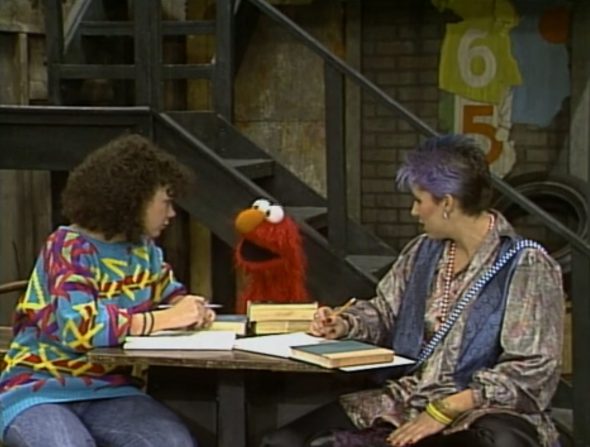
TP: Yeah, that was kind of before he was the huge star of Sesame Street when you worked with him.
DS: Oh, I knew Elmo when he was just a lowly character, trying to make his way to stardom. Yeah, he had only been on maybe once or twice! We’re going back 30-some-odd years. We just thought he was the cutest thing. And of course, Elmo became wildly popular. It’s just amazing, what goes on. I don’t even remember who the director was…
TP: Would that have been Jon Stone? Bearded guy, middle-aged?
DS: Possibly! I just had such a great experience, and they treated everybody like royalty. I would say Sesame Street is the happiest place on Earth. I know people think Disney is, but I think Sesame Street is.
TP: There’s something to that! Well, it’s a remarkable story, and I’m sorry they didn’t bring Tanya back. They definitely should have.
Is there anything else you’d like Sesame Street fans to know?
DS: Well, it’s just interesting that you never know what’s going to happen in your life, so you always have to see life in a way that, when things don’t happen in a way that you think they should go, your life will always work out.
Click here to learn the meaning of the word “original” on the Tough Pigs forum!
by Ryan Roe – Ryan@ToughPigs.com

